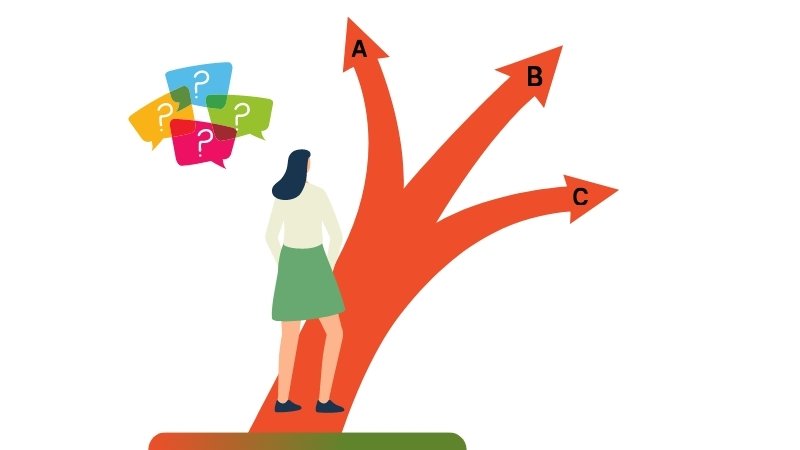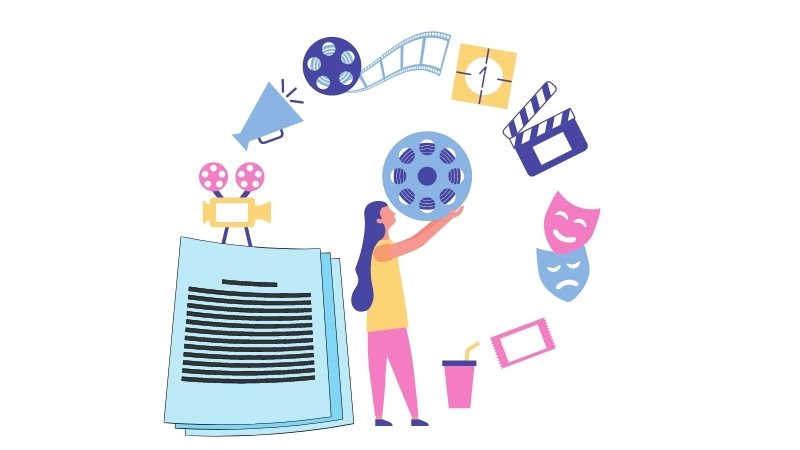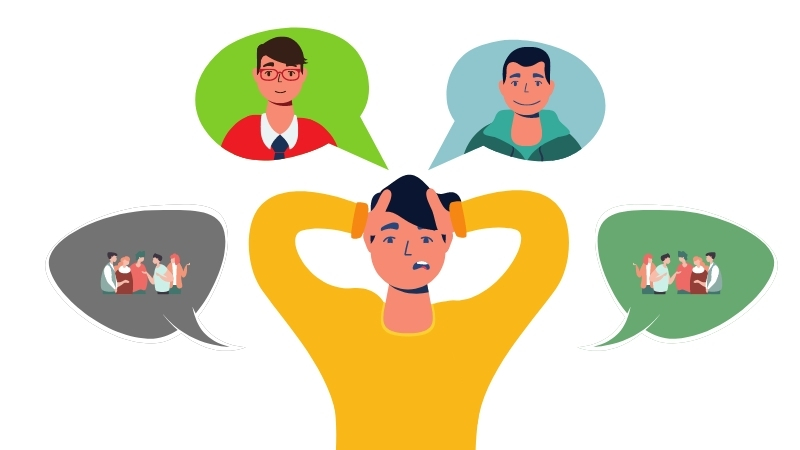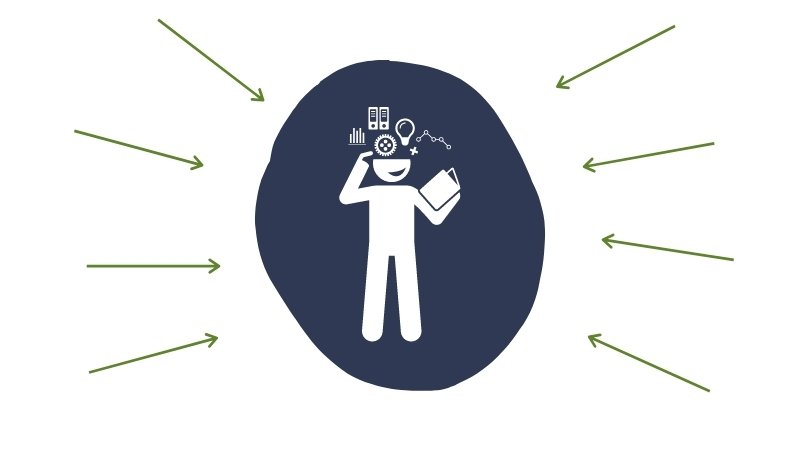The Art Of Choosing by Sheena Iyengar is a guide to making rational choices.
In this book, the author talks about how we all are complex beings and how external as well as internal factors affect the choices we make.
Alright, so without further ado, let’s get started…
[amazon box=”0446504114″ template=”horizontal”]
The Art Of Choosing Summary (PDF)
Lesson #1: Choose wisely using reason and logic

We all make choices.
Sometimes they are big e.g. career choices.
While the other times they are just for fun e.g. deciding what to watch on Netflix.
The question is:
How do you make the right choices?
Let’s try to understand a few things to find the answer to this question.
The author found out that we tend to make choices even when they are not necessary.
At certain moments, we have to make decisions.
But there are moments when instead of making decisions, we have to keep going.
Our ability to make decisions and choose is essential for our survival, isn’t it?
Even in hopeless situations, we like to choose.
And it helps us in our survival.
But what about little things in life that don’t carry much significance.
We like to choose where to live, what to eat, what to do, etc.
The problem happens when you forget to choose and start reacting based on your sensory information.
We have 5 senses:
- Touch
- Sight
- Hearing
- Smell
- Taste
We take input through these senses and react.
Most people don’t even realize that they have a choice before they act.
The author says that our desire to choose is so strong that sometimes it interferes with our benefits.
So what’s the right way to choose?
Should you react without thinking?
When you react without thinking, there is no logic.
Logic can’t exist without thoughts.
We have a complex brain such that sometimes our body reacts on its own — before we even have a chance to think.
Doesn’t it happen — that your body reacts when you sense danger?
It happens because we have a complex brain.
In those times, there is no choice.
But other than that, you always have a choice.
Whether to choose or not to choose is also a choice, isn’t it?
The author says that if you want to make the right choices, you have to look at all the available options and then use reason and logic to find the right one.
The good thing is:
We have got a nice supercomputer right in our heads.
So most of the things are already taken care of…
But often those scripts in our heads require some input from us.
What are those scripts and how do they affect our choices?
Suggested Reading: Rewire Your Anxious Brain Summary
Lesson #2: Most people follow scripts written by others and never choose

The author talks about two types of people in this book:
- Individualists
- Collectivists
First, let’s talk about collectivists.
Collectivists are the sort of people who believe in ‘group thinking.’
They believe in the common good.
They give more preference to the collective goal of the society instead of taking much stand on their personal choices.
On the flip side, individualists take a stand.
They give more preference to their personal goals.
They believe that the world revolves around them.
Put simply, the individualists are more concerned about “I” and “me.”
While on the other side, collectivists are more concerned about “we.”
These two are extreme cases.
There is no single person, though, who is purely individualist or collectivist.
It’s a way of looking at how people perceive their situations and make choices.
If a person is an individualist, he will choose whatever makes him happy or help him achieve his goal.
But if a person is collectivist, he is more likely to sacrifice his happiness for the welfare of the community or society.
I don’t recommend that you choose any of these.
If you are purely individualist, you are selfish.
Because you are only thinking about yourself.
And if you are purely a collectivist, you will suffer for others.
Which is also not a great way of living.
There must be a way so that everybody can live without suffering and be joyful.
Shouldn’t it?
In one chapter, the author talks about how Asian-Americans are more on the collectivist side.
She talks about how her parents were forced into an arranged marriage.
Because their life was predetermined by other people — by the society.
Her parents had no choice, but to follow the script that was written already by the elders.
In most countries, particularly eastern Asian countries, most people still do marriages like this.
They are not given any options.
But relatively, in western countries, people are given freedom of choice when it comes to marriage.
Sadly, most people never really live their own story.
For most people, their story has already been written by society.
For most people, society decides what they should or shouldn’t do — even during major life decisions like marriage or profession.
What you can learn from this?
First, you must realize the power of your choice.
From previous summaries, we’ve learned that making the right choice is crucial.
We all have a choice if we realize this simple fact that the choice is in our nature.
We can choose.
But more often than not, our choices are not really ours — even when they seem as if they are made by us.
Lesson #3: Our choices are shaped by our culture and beliefs

We just talked about how our lives are delivered to us in the form of scripts like it happens in movies.
When you watch any movie, it’s pre-recorded.
You can’t change anything that’s going on in the movie.
Or can you?
People who believe in collectivism are more traditional.
They hardly embrace their freedom of choice. And choose to live a traditional life.
This doesn’t mean that it’s a bad thing.
Because when people give more preference to a common goal, the entire community grows.
But even if you think that you are an individualist, not all your choices are yours.
Let’s understand this…
No matter who you are and what you think, your choices are heavily biased.
Right from your childhood, you start discovering your tastes and preferences, right?
The thing is:
Your options are simply choices made by others.
For instance, parents decide what their kid should wear, what he should eat, and so on…
So in those cases, the kid never had a choice.
All his choices were limited.
If out of 100 options, you are only presented with 9, then can you say you had a choice?
Even though it seems like you had a choice, you didn’t. Because you didn’t see all the options.
You chose out of limited options.
And who decided how many of those options you will be presented with?
Other people: The society. Your elders. Your teachers. And so many other people.
Can you see it? Do you understand now?
As we grow up, society decides many things for us.
And those choices, sooner or later, determine our tastes or preferences.
And ultimately, they become a part of our identity.
Again, who shaped your identity?
Both you and the society.
Your culture shapes your beliefs.
Then your beliefs become a part of you — and determine your identity.
But it feels like that you are the one pulling the shots.
You feel as if all your decisions are yours only.
That’s not true.
Now you understand it, right?
Note that:
The idea here is not to discourage you by telling you that you don’t have a choice.
You always have a choice!
But the way you think, the way you approach your situations, they are influenced by your beliefs. Most of which comes from the culture and the society.
So it’s not anybody’s fault.
This is the reality. It’s just how our minds work.
Suggested Read: Influence by Robert Cialdini Summary
Lesson #4: Those who believe they have a choice feel more freedom than they actually have
Do you feel that your current job doesn’t give you much freedom?
Are you stuck in your relationship?
Well, here is something for you:
If you believe that you have more freedom than other people, then congrats, chances are, you have more freedom of choice.
And if you don’t, then it might also be true.
Allow me to explain.
During an experiment, it was found that the people who thought they had more freedom in their job, actually felt freer than others who believed that they had less freedom of choice.
What’s going on here?
This was simply a case of the mindset.
When you feel that you have more freedom, you start looking for opportunities and options.
This again opens up a further room.
So keep your mindset positive when you feel that you are stuck — doesn’t matter where.
If you think that you don’t have a choice, you will feel discouraged to look for the available options.
And won’t take the needed action.
I recommend that you take a quick analysis of the real scenario. And don’t just make imaginations.
Look closely at your circumstances.
Then you will find out that you always have a choice.
Imagine the worst possible case. Chances are it’s better than the Nazi camp — where people suffered a lot.
Suggested Read: Man’s Search For Meaning by Viktor Frankl Summary
But even during such terrible circumstances — those who survived were the ones who thought that they had a choice.
This is what most people do:
They give excuses even when they have a lot of possible options to choose from.
They shut off their mind and focus on how helpless they are.
But as long as you believe and realize the power of choice, you will eventually find a solution to your problem.
Lesson #5: We embrace uniqueness — but don’t want to stand out too much either.
Sound weird, right?
How can we contradict our own beliefs?
Good question…
The author talks about an experiment where people were shown some dots on the screen. And they were asked to estimate the number of dots.
But there was more to it…
Some people were told that they were in the majority while the others were told the opposite i.e they were in the minority.
When people were told that belonged to the majority group, they felt dissatisfied.
Okay… So whether they did the right estimate was less important.
The real goal there was to test the response of the people.
What did that experiment conclude?
It concluded that we are highly concerned about how people see and how we see ourselves.
We are concerned with our identities in comparison to other people.
The author says that we want to stand out — but not so much that we become a minority.
And this affects our daily choices.
Just look at your tastes and preferences.
Notice the movies you watch, the celebrities you follow on social media, your role models, etc.
You have chosen them, right?
Or someone else did? This is also a big question, though. But let’s stick to the previous question for the sake of this summary.
Would you like it if I tell you that you are like everybody else?
Would you like it if you knew that your choices are the same as everyone else?
How does it feel to know that you are a part of a crowd?
A crowd has no identity.
Any crowd follows traditions and rules.
There is not much choice there.
How do you feel right now?
It feels bad. Doesn’t it?
When you hear or read that you are pretty much the same as everybody else, it hurts your EGO.
Okay, so if we are all the same in different coverings, why do we feel sad about it?
The author says that the idea, that we are all unique, comes from the media and the culture.
After all, if all are unique, then doesn’t it mean that there is no uniqueness?
Now, why do we want to feel unique?
There are certain benefits of it:
People who look unique and at the same time fit in with the norms of society are highly respected and looked up to.
We all want acknowledgment, don’t we?
So we reinforce this idea that all people are unique.
There is the other side of it too…
We don’t want to be too unique. Because it has certain downfalls.
We have to fit in with the norms of society too.
Otherwise, we won’t be relatable.
The author sarcastically points out that we are all thinking that other people are sheep. We think that nobody — other than us — has a mind that thinks individually.
There is this popular idea: “Be unique. Don’t be like everyone else.”
It’s so captivating that we gladly accept this idea.
But if you use logic and reasoning, you’ll see that we all have limited options and thus limited choices.
So most of our choices are similar — if not the same.
Lesson #6: We are bad at logic and reasoning — more than we think.
The author talks about how we want to make sense of everything we do. Even when they don’t make any sense.
We are wrong at many things.
We make bad choices.
We go to the wrong places.
We choose the wrong professions.
Our concepts of this world are wrong.
We don’t know everything — but love to think that we have figured everything out.
Our daily choices don’t make much sense when analyzed critically.
Even during the adversities, we don’t take the actions requires.
We have so many biases.
We are prone to logical fallacies.
But despite all this, we think that we are logical.
We make stories to satisfy our inherent need to find logic.
Everybody thinks that he or she is the most intelligent.
And those who don’t, think that there is something wrong with others.
We tend to believe in useless ideas that have no connection to reality.
Most people still choose to believe in superstitions despite knowing science.
We think that we are giving our best.
Are we really?
Our concepts of life are twisted.
Nothing makes sense.
But still, most people live in the dream that someday everything will become fine.
We hope to achieve something in the future — when we can’t even accurately recall our past.
When things are going smoothly, we think that there must be something wrong.
But when things are not going smoothly, we think that everything is fine.
We overestimate the positive results. And underestimate the negative results.
Don’t we do this often?
But despite all of our shortcomings — we believe that we are all amazing.
We believe that everybody is unique.
Which is contradictory in itself.
We know that we need to understand our minds first to achieve great results.
But still, we put it on the back-burner and confirm our pre-existing ideas by following other people who are doing exactly the opposite.
Don’t you think that unless we know our minds — whatever we do — will be illogical?
We have an image our ourselves in our minds.
We never try to understand how our mind works.
Most people never sacrifice short-term gains to amplify their long-term gains.
We want to win a big lottery someday — realizing that a lottery can’t make one rich. It’s temporary.
Unless one has enough financial knowledge, he can’t sustain tremendous wealth.
We make terrible decisions.
And choose the wrong paths.
Our reflective mind says something else. Our subconscious mind craves something other.
Even funnier, we end up doing something else.
Our actions, choices, and beliefs seldom resonate with each other.
Then we make stories to satisfy or fool our minds — and say “everything is alright!”
Why? Of course, to make sense of our choices and actions.
Believe it or not, we are inherently biased — more than we think.
Lesson #7: Narrow down your choices to make choice-making easy
We have lots of choices to make, right?
Every moment we find something that forces us to make a decision.
Even right now, whether consciously or unconsciously, you are choosing to read this summary.
You could be doing something else.
But you chose to read this summary in its entirety.
Because you want to learn, grow, and thus reach your full potential.
You want to learn the art of choosing wisely, don’t you?
The thing is:
We can only handle so many choices.
So there must be some way to filter out unnecessary options.
For instance, if you want to purchase a new ‘mobile phone,’ you can decide early on what features you need in your mobile phone.
Why? Because if you don’t know exactly what you want, it’ll consume a lot of time.
“I need a new mobile.”
It sounds too generic, doesn’t it?
Now, notice this:
“I need a mobile with 6 GB RAM and a decent processor to watch educational videos and complete my assignment.”
How does that sound?
It’s specific, isn’t it?
See… how we solved a complex problem here.
To narrow down your choices, you have to find out what you need.
That’s the key…
Once you know what you need exactly, you can ignore the other options that don’t match your needs.
But sometimes people dive right in without thinking. And end up wasting a lot of time.
They set too generic goals.
And end up doing more work than required.
Sometimes, they end up even more confused than before.
The key idea here is:
If you have lots of options, always eliminate the unnecessary ones.
Then finally, choose the best one.
But be careful while eliminating, you might make mistakes…
The reason this is important is:
We have a limited attention span.
Some say that it is even shorter than that of a goldfish.
Once you lose attention, you are prone to make mistakes while choosing.
Lots of options might overwhelm your mind.
You may get confused.
And avoid making choice altogether.
Let’s take an example:
When you watch Netflix, there are lots of movies and serials, right?
There is so much to watch…
When there is so much to choose from, it gets harder to find what will satisfy you.
It’s like having a paralyzed mind, which can’t think.
To make a decision then, you’ll need to select a category.
Let’s say ‘Action.’
You can also narrow down further and find other ‘Sub-Categories.’
It won’t solve your problem. But it’ll make things a bit easier.
When you face any challenge in life or you have to make a decision, use your intellect and find the best possible option.
Read: How to be more productive in life? (Easy Actionable Guide)
Lesson #8: Don’t always rely on your memory to make sound decisions
Here is how most people make decisions:
They rely on their memories or the lessons they have learned from their experience.
Whatever experience you have gathered is history.
Make sense?
When you say, you have experienced something, it means that thing happened in the past.
Now you have the memory of that incident.
Memory is a helpful feature of our brain.
It helps us remember things. Which often come in handy while making decisions.
And sometimes, they save a hell lot of time.
With experience, comes a sense of confidence. Which again helps us clear up our minds.
So what’s the problem here?
Why you shouldn’t always rely on your memory?
The answer is:
More often than not, we are biased.
We have already discussed it, haven’t we?
The thing is:
We don’t have a memory like our pen-drives — which can store any data as long as they exist.
Our memories don’t last forever.
Try to recall something of the past.
What do you remember?
Do you remember every fine detail?
Well, unless your brain is a super-computer, you can’t.
Of course, there might be some experiences that can leave a dramatic impression on your memory.
But generally speaking, we only remember only a handful of things.
So how does it affect our ability to choose?
Let’s say, you are solving a Multiple Choice Question in your exam.
There are four options to choose from.
Let’s say, two of them sound familiar to you.
Now you might end up choosing the one that has a stronger impression on your mind.
If you are faced with puzzling options, which option will you choose: the one that you believe will work or the one you have less to no idea?
Most people will go with the one that has a stronger presence in their memory.
The key idea here is:
Relying on memory can be handy. But we shouldn’t rely too much on it.
We should look and analyze all the possible options.
And also take the help of our memory.
Relying solely on memory is not a good idea.
We only remember those things that touch us on an emotional level.
We remember the days when we had a lot of fun with our friends.
We remember the day when we achieved something great.
We tend to forget the bad memories — because we want to avoid them.
Who wants to remember the bad times and feel sad, or do you?
We absolutely hate it, right?
Sometimes our memories interfere with our logical brain.
And creates unnecessary confusion.
And when there is any confusion, we are more likely to commit a mistake.
Our emotional brain says something. While our logical brain says something else.
The author says that we have two systems in our brains:
- Reflective System
- Automatic System
Don’t worry about the jargons here:
The reflective system is simply our rational brain — that helps us think logically.
While the automatic system is our subconscious brain — which is a powerhouse of experience.
The automatic system is like an old grandpa who knows a lot of things.
While the reflective system is like a kid who keeps learning and asks a lot of questions.
Sometimes, there are conflicts between them.
The key here is:
To harmonize both of your systems and ending the unwanted conflict.
Listen to both of them.
Understand both of them.
Don’t be biased. Don’t take sides here.
Don’t say that I will only listen to my reflective system.
You need both of them to make sound decisions.
Lesson #9: Self-Knowledge is the key to improve your decision-making ability

We just talked about how we can improve our decision-making ability.
(Please note that I’m using both ‘choice’ and ‘decision’ interchangeably.)
When you are making any decision, who is the one making choices?
It is you.
Who wants to make the right decisions and at the same time avoid making bad decisions?
It’s you.
So the key here is to attain self-knowledge — to understand this thing called Self.
It doesn’t really matter what you choose if you understand your Self.
Most people make mistakes during decision-making because they don’t understand themselves.
Remember? We talked about how we want to fit in with society.
And how our ability to choose is affected by external influences like culture, elders, etc.
So our memories are always changing.
Even our beliefs shatter. Then new ones build up.
(Sometimes, they get even more rigid than before.)
Our mind is never static. It’s always changing and searching… and keeps taking inputs from the environment.
Who is not changing?
Think…
The answer is Self.
You are not changing.
I mean, your true self is always the same.
Everything can change — but your true self always remains the same.
So attaining self-knowledge is crucial.
Because who is going to choose?
Of course, it’s you who has to choose.
And if you don’t understand your true self, you are going to choose the wrong thing regardless of how logical you might be.
Let’s understand this thing with an example…
Let’s say there are two persons:
- One is an Actor.
- While the other is a high-school student.
Since the actor has to learn acting, he has to watch a lot of movies and learn.
But the same thing is not true for the student.
If the student spends a lot of time watching movies, he might waste his precious time, which could be used for learning new skills.
Did you see it?
Although, in this case, the choices are the same for both persons, the outcomes may be entirely different.
Whether the choice is right or wrong depends more on the person making the choice — rather than the choice itself.
Yes, the options are important too.
But ultimately, the person who has to make the choice is more important.
Why?
Because if there is no person, the choice can’t exist.
Do you understand?
Put simply, you can’t make the right choice without self-knowledge.
You can be lucky sometimes, but you won’t truly understand if you made the right decision or not — unless you understand your true self.
If I go a little out of context, I would rather say that the action itself doesn’t matter. What matters more is the person performing the action.
When you understand the doer, every action is right.
In that case, the action comes with the total understanding of the Self.
When that happens, there is no right or wrong. There is only the truth.
(Hmm… That sounds interesting!)
The Art Of Choosing Takeaways
Congratulations…!
That was a lot to take in, wasn’t it?
But anyway, unlike most people, you finished it.
Pat yourself on the back.
Let’s quickly recap what we learned from this exhaustive summary:
- Choose wisely using reason and logic.
- Don’t always follow the scripts written by others — choose.
- Our choices are influenced by our culture or society.
- Your paradigm affects how much choice or freedom you feel in any situation.
- We all want to stand out — but also fear being in the minority.
- Memory can be faulty at times while making choices.
- Develop self-knowledge to make sound decisions.
The Art Of Choosing Quotes
Here are some of my favorite quotes from The Art Of Choosing by Sheena Iyengar:
“What you see determines how you interpret the world, which in turn influences what you expect of the world and how you expect the story of your life to unfold.”
“We all make assumptions about the world—based on individual experience and cultural background—that affect our judgment of how that balance should look.”
The Art Of Choosing Ted Talk Summary
Here is Sheena Iyengar’s (The author of this book) Ted Talk video.
I recommend that you watch this video to dive even deeper and clear your ideas about making choices.
Sheena Iyengar’s Ted Talk Video
The Art Of Choosing Review
[amazon box=”0446504114″ template=”horizontal”]
As always, I’m going to brutally honest here.
No hard feelings.
I’ll only share my feelings and experience while going through this book.
At first, I didn’t like this book.
I thought that I made a mistake buying it.
But then I forced myself to read it…
I thought: “Hmm… I’ve bought it. No turning back. I should give it another shot.”
(Funny, my choices were affected by how most people think)
Surprisingly, my opinions changed a bit after reading a few pages again.
The first half of this book is good.
But I struggled a bit to finish the second half.
It drained my energy and patience a little.
The weird thing is:
Although the book is full of scientific researches, it felt a bit too biased.
The author expressed her views and opinions about how we think without holding anything back.
I think some people won’t enjoy that.
But if you are okay with that, you can read this.
I would say, the book won’t be as enjoyable as some other popular titles out there.
Personally, I found it a little boring.
The author sounds like “I know everything… Let me teach you.”
It might be a turn-off for some readers.
Hard to say… I have mixed opinions about this book.
I would give this book a rating of 6/10.
Now It’s Your Turn
I hope you learned lots of valuable lessons from this book summary.
And hopefully, you will work on your decision-making.
At the same time, I hope you will understand how our psychological biases can significantly affect our choices. And why we should be vigilant while making important decisions.
Have any questions? Leave a comment and let me know.
I can clear most of your doubts…
And as always:
Share this summary with your friends and family members.
